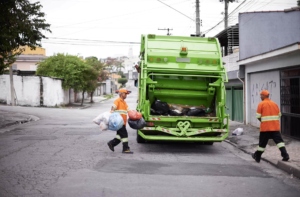10 Scary Sustainability Statistics Your Company Should Avoid
With Halloween around the corner, it’s the perfect time to share some downright scary sustainability statistics and take a deeper look into the darker sides of sustainability.
Whether you’re actively participating in waste audits and sustainability initiatives or are considering increasing your company’s eco-friendly efforts, these ten spooky statistics are worth having on your radar.
10 Spooky Stats That Illustrate the Effect of Ignoring Sustainability
Here are ten frightening sustainability stats you need to know about this spooky season.
1. 74% of investors are more likely to divest from businesses with low sustainability performance
It’s no longer hypothetical. Investors are now saying they plan to divest from companies with low sustainability performance (International Institute for Management Development). If your organization is already doing the work in ESG, this statistic isn’t scary. But, if you’re lacking in sustainability initiatives or don’t have the reporting to prove it, you could be in serious danger of losing investors. Now that’s a chilling fact.
2. One-third of U.S. companies don’t make any environmental disclosures
In a time when sustainability is becoming increasingly important to consumers and investors, approximately one-third of Russell 1000 companies still aren’t making any environmental disclosures (JustCapital). While this could just mean that they don’t have any metrics to report, it could also indicate that nothing is being done. Yikes!
To add insult to injury, most companies that disclose data only disclose about three data points out of the estimated 13 data points available. In other words, even those that are reporting are significantly under-reporting. This is a truly frightening statistic because it shows the current lack of transparency in corporate ESG reporting and how far many companies still have to go to meet the impending SEC requirements.
3. The 7 highest polluting industries are energy, transport, manufacturing and construction, agriculture, food retail, fashion, and technology
These seven industries are the biggest offenders when considering water, air, and soil pollution (The Eco Experts). At the top of the list, the energy industry produces 15.83 billion greenhouse gas (GHG) emissions yearly, compared to the technology industry, which produces just over 1.02 billion annually. These seven industries create an estimated 42.57 billion in GHG emissions annually (of the total 50 billion GHG emissions).
If you’re in one of the top-offending industries, your ESG efforts will likely continue to be put under a microscope, so it will be important to demonstrate the initiatives your organization is pursuing to decrease your carbon footprint.
4. Only 5% of plastics are recycled in the U.S. annually – down from 8.7%
Even though most plastic is recyclable, the U.S. only recycled between 5-6% of all plastics in 2021 (Smithsonian). That’s less than the 8.7% recycled in 2018, which means our plastic recycling efficacy has declined instead of improved over time. In fact, 85% of all plastics went straight to the landfill – and 10% were incinerated.
With plastic use on the rise, recycling on the decline, and landfill space running out, our plastic problem is big enough to spook anyone.
5. Restaurants, retail stores, and institutions (like schools, hospitals, and hotels) throw out more than 72 billion pounds of food each year
Every year, restaurants generate between 22-33 billion pounds, retail stores produce 43 billion pounds, and institutions toss out between 7-10 billion pounds of organic waste every year (FoodPrint.org). Together, these industries throw away between 72-86 billion pounds of organic waste annually, most of which is usable food waste.
Organic waste is problematic because not only do we toss out the food, but we also waste the energy and water it took to harvest, cultivate, transport, and package the food. Once it’s in the landfill, organic material produces methane, making this issue incredibly scary. The environmental hazards combined with increasing food insecurity have made organics recycling and composting a hot topic and a must-do for retailers, restaurants, and institutions.
6. At least 42% of all green claims are exaggerated, deceptive, or false
Greenwashing is a serious problem that’s received mounting national attention. This practice involves providing a misleading or false impression that a company’s products or processes are more sustainable than they actually are.
Recent studies show that at least 42% of corporate sustainability claims are exaggerated, deceptive, or false (Green Business Bureau). But the number could easily be much higher since 59% of the time, there’s no evidence to support green claims. Which is why having unalterable and verifiable waste and recycling data is crucial to support your sustainability efforts.
7. Only 8.6% of the worldwide economy is circular
Our current economic model relies on taking resources, creating products, and then tossing those products when we’re done with them. The circular economic structure aims to get rid of waste by keeping reusable resources out of landfills and in the production cycle through practices like reusing, repairing, recycling, refurbishing, leasing, and sharing.
But we are far from achieving this model. Today, more than 90% of the resources we extract and consume do not return to production cycles. Only 8.6% of the entire global economy is circular (Renewable Matter). By putting some solid sustainability practices in place, your company could help increase that percentage.
8. 11.3 million tons of textiles go to landfills annually
Thanks to fast fashion and poor regulation, nearly 11.3 million tons of textiles end up in landfills yearly, accounting for almost 8% of the total landfill waste (Environmental Protection Agency). What makes this statistic so alarming is that it takes more than 200 years for many of those textiles to decompose. It’s also why incorporating textile recycling into your waste diversion strategy is so important.
9. 37 pieces of EPR legislation have been introduced in the United States
EPR, aka Extended Producer Responsibility, is a policy tool used to manage and reduce consumer waste by making product distributors and manufacturers responsible for the packaging and products at the end of life.
From take-back programs to consumer education, EPR systems have long been popular in the EU, but they’ve slowly made their way to the United States, too. As of September 2022, 37 pieces of EPR legislation have been introduced or passed at the state level (Retail Compliance Center), illustrating the growing importance of environmental initiatives from a government standpoint. This shows how important it is to consider how your organization can contribute to the end of life of your products and packages via things like take-back programs.
10. Over 2,000 companies have science-based carbon targets, and 1/3 of Europe’s largest public companies have promised to reach net zero by 2050
From a sustainability perspective, this statistic (from the Harvard Business Review) is probably the least frightening one on our list. But if you’re a company that isn’t prioritizing ESG goals and green initiatives, it might be scary to know that you could be left behind.
As more corporations and governments begin to prioritize things like carbon neutrality, the entire business landscape will have to adapt quickly to stay ahead and meet consumer and investor demands.
Alleviate Your Fear with Waste Audits
At CheckSammy, we’re passionate about helping companies increase their sustainability efforts with our comprehensive suite of sustainability programs. From junk removal and take-back programs to textile and organics recycling, we have the technology and expertise to help you raise your ESG score – and the verifiable data to prove it.
We recommend starting with waste assessments to get an idea of where you are now and identify areas for improvement. From there, we’ll create a completely customized program to help you achieve your sustainability goals. Learn more about our waste audits here.
See Our Services
Create a custom solution to meet your waste and sustainability goals. Contact us today!
Continue reading
Dive deeper into the CheckSammy Blog by reading one of our posts below
Feeling the Pain of Higher Resident Turnover? Apartment Junk Removal Can Help
If you’re a property manager, you’ve probably had a significant increase in tenant turnover over the last couple of years. So it’s no wonder apartment junk removal may be top of mind for you right now. There are several reasons for this shift. For one, the housing market is on fire right now. In 2020 […]
Read More About Feeling the Pain of Higher Resident Turnover? Apartment Junk Removal Can HelpSetting Up a Community E-waste Recycling Program
E-waste is the fastest-growing municipal waste stream according to the EPA, yet e-waste recycling isn’t keeping pace. In fact, only 12.5% of all e-waste is recycled, reports the EPA. Starting a community e-waste recycling program is a terrific way to ensure hazardous e-waste, like lithium-ion batteries, doesn’t end up in your community’s landfill. Creating an […]
Read More About Setting Up a Community E-waste Recycling ProgramWaste Management’s Role in the Circular Economy
Establishing a waste management program for your business or community is one of the best ways you can contribute to the circular economy. Here’s everything you need to know about waste management’s role in the circular economy (and how to get involved). What Is the Circular Economy? Our current economic model is all about taking […]
Read More About Waste Management’s Role in the Circular Economy5 Reasons to Consider a Textile Recycling Program for Your Organization
Americans sent more than 17 million tons of textiles to landfills in 2018, a volume that is only increasing every year, reports the Environmental Protection Agency. When you think about the fact that it can take over 200 years for textiles to decompose, it’s easy to grasp how large textile waste’s contribution is to the […]
Read More About 5 Reasons to Consider a Textile Recycling Program for Your Organization8 Benefits of Environmentally Friendly Power Washing Services
If you’re into maintaining the curb appeal of your business or home, then you’ve probably heard of pressure washing. Pressure cleaning involves using high-pressure water spray to remove grime, mold, dust, paint, mud, and other junk from objects or surfaces. Many people worry that pressure washing isn’t good for the environment, but this couldn’t be […]
Read More About 8 Benefits of Environmentally Friendly Power Washing ServicesWhy Our Customers Love Our Full-Service Junk Removal
If you’re looking for full-service junk removal services, you’ve come to the right place. CheckSammy is a one-stop shop for all your junk removal and sustainability needs. From our affordability, simplicity, and unrivaled turnaround times to our innovative sustainability solutions and patented technology and data, it’s clear why some of North America’s biggest companies choose […]
Read More About Why Our Customers Love Our Full-Service Junk RemovalTips for a Stress-Free Move From An Eco-Friendly Junk Removal Company
What does an eco-friendly junk removal company know about moving? Quite a lot, actually. Moving can be an especially chaotic time. You have to pack everything up, get rid of unwanted items, clean your property, load everything up, and move your things to your new location. That doesn’t even include the unpacking and resettling period. […]
Read More About Tips for a Stress-Free Move From An Eco-Friendly Junk Removal CompanyCollege Junk Removal Tips for Student Move-In Day
As the new school year gears up, colleges across the country are looking for ways to clean up their campuses before the new year begins, and many of them want to do so sustainably. College junk removal isn’t easy, though, especially around move-in week—and when trying to do so sustainably. As students move in and […]
Read More About College Junk Removal Tips for Student Move-In Day8 Items Hospitality Businesses May Not Know They Can Recycle
One hotel guest produces 2.5 pounds of trash every single day. Just a single hotel room produces around one cubic yard of waste each month, which totals 200 gallons of waste per room every month. Most of this waste goes straight to the landfill, even though research shows that up to 60% of it is […]
Read More About 8 Items Hospitality Businesses May Not Know They Can Recycle












